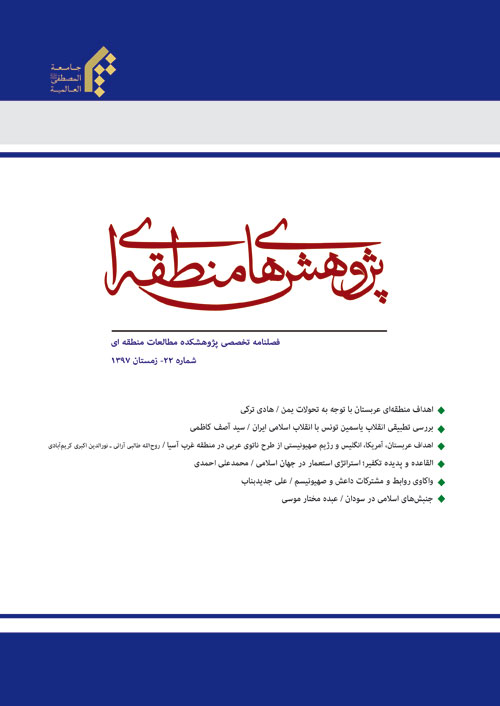Political and Social challenges faced by Saudi Arabia in the light of the Islamic Awakening
Author(s):
Abstract:
The socio-political as well as the economic structure of Saudi Arabia under the reign of the Saudi Regime, has for years stood against the wants of people for change and the slogan of reform shouted by different religious, political and ethnic sects. This structure which is based on an authoritative patriarch sort of governance, was shaped after year 1932 in a combination of the religious teachings of Wahhabism with the power of the Saudi linage which resulted in the matching of the Sheikh linage as the religious chief with the Saudi linage as the political authority, forming the current structure in Saudi Arabia. During the past 80 years this government, by means of its ample oil income, and its religious rationalization based on Wahhabism, and more so through alliance with the West and the USA, has managed to escape the harm intended by the oppositions. However in the outset of the second decade of the twenty first century, severe earthquakes took place in the Middle-East under the title “Islamic Awakening”, the follow ups of which were later on felt in Saudi Arabia. The revolutions in Tunisia, Egypt and Libya and even more significant, the uprising of the people in Bahrain and Yemen who were the neighbouring allies of Saudi Arabia, have strengthened the wills of the opposition groups in Saudi for change. The role and the significance of Saudi Arabia in transformations of the region and of the Arab world, and the effect of its internal reformation on the regional condition, enhance the impact of its internal transitions. The main question of the present article is: what would be the main challenges of Saudi Arabia from domestic will for change affected by the 2011 reforms under the title “the Arab Spring”, and what outcome would it bring forth? The point that people, despite the efforts by the state for restoring peace and calm through oil incomes and religious justifications, do not reckon the current structure eligible for meeting their political, economical and religious needs and admirations, and that by the influence of Islamic teachings and the revolts taking place in the region, they are after a new structure for their political order, accounts for the hypothesis of this article.
Keywords:
Language:
Persian
Published:
فصلنامه پژوهش های منطقه ای, Volume:1 Issue: 1, 2013
Page:
125
magiran.com/p1206591
دانلود و مطالعه متن این مقاله با یکی از روشهای زیر امکان پذیر است:
اشتراک شخصی
با عضویت و پرداخت آنلاین حق اشتراک یکساله به مبلغ 1,390,000ريال میتوانید 70 عنوان مطلب دانلود کنید!
اشتراک سازمانی
به کتابخانه دانشگاه یا محل کار خود پیشنهاد کنید تا اشتراک سازمانی این پایگاه را برای دسترسی نامحدود همه کاربران به متن مطالب تهیه نمایند!
توجه!
- حق عضویت دریافتی صرف حمایت از نشریات عضو و نگهداری، تکمیل و توسعه مگیران میشود.
- پرداخت حق اشتراک و دانلود مقالات اجازه بازنشر آن در سایر رسانههای چاپی و دیجیتال را به کاربر نمیدهد.
In order to view content subscription is required
Personal subscription
Subscribe magiran.com for 70 € euros via PayPal and download 70 articles during a year.
Organization subscription
Please contact us to subscribe your university or library for unlimited access!


